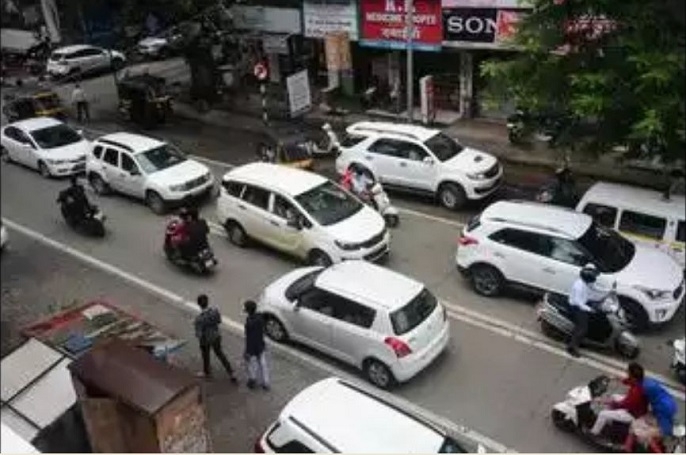Most welcome -- but it’s a day too late !
| Date :29-Aug-2024 |

■ Vijay Phanshikar

SO, THE honourable High Court
has appointed a Joint Inspection
Committee to monitor the action
taken by the Nagpur Municipal
Corporation (NMC) and the
Nagpur Police about parking
spaces, hospitals and any
violations of by-laws and other
civic issues particularly in the
crowded and messy Dhantoli area.
This action is most welcome in
every which the way.
Yet, the loosefooter cannot
escape the uneasy feeling that this
action has come a day too late.
For, as he wonders, will there be
any agency or person powerful
enough to undo the damage that
has already been done -- thanks to
the laxity of administration (and
possibly corruption)? For, the
Dhantoli woes do not appear good
enough to be rectified at such a
late stage unless a massive drive is
undertaken either to direct various
facilities and entities altogether to
move out of the area -- and
demolish, if needed, the illegal
arrangements done by people on a
sly basis.
This is not pessimism -- the
loose footer insists.
On the contrary, this is
realism, denying which would be
disastrous in the long run. For,
what has happened in Dhantoli is
happening also in many other
areas -- such as the neighbouring
Ramdaspeth. Areas like Bajaj
Nagar, Laxmi Nagar, Shankar
Nagar, Dharampeth, Gokulpeth,
Tilak Nagar, also are
facing more or less similar
issues -- of the creation of an inept
bureaucracy and corrupt system
that is all the time waiting to be
bought over.
And yes, most such things are
happening also in Sitabuldi, Sadar,
Itwari, Mahal, Jaripatka, Pachpaoli,
Hanuman Nagar, Wardhaman
Nagar, and Ajni, and Hindustan
Colony on Wardha Road, Narendra
Nagar, Besa, Beltarodi, Manish
Nagar... !
But let us return to Dhantoli for
the current discourse. This is one
area whose woes caught the
attention of the honourable
judges for whatever (but welcome)
reasons. But the reality of the
Dhantoli area is that before the
honourable High Court was woken
up through normal process, much
dirty water had flown under the
bridge, much muck had been
collected by way of unplanned
development and administrative
sanctions to activities that were
suspect in law, to say the least.
For, otherwise, how could one
single area be made home to
dozens of hospitals with little
thought to basic principles and
precepts of town-planning and
urban design and utilitarian
value? In Dhantoli, each of these
dimensions appears to have been
given a go-by.
Hence the haphazard placement
of hospitals. Hence the haphazard
parking. Hence a total absence of
regulation or control on any
count.
So, one day, a Commissioner of
Police rises in the morning and
orders the entire Dhantoli area as
a ‘No Parking’ zone. In one single
day, Dhantoli becomes all of a
suddenly a beautiful open place,
so to say. That ban on parking
lasted for some time, and then
went for a toss -- for whatever
reason. For, obviously, it was a
bad idea implemented in utter
haste and without much thought.
Today, what Dhantoli offers to
people is nothing but a chaos
whose solutions would need
all the gods in the heavens to
descend on the Earth and redefine
the universal laws of common
sense -- so that some order could
be established in Dhantoli.
CONSIDERING all this, the
Joint Inspection Committee
has a lot of work on hand, --
and a lot of bad blood, too, if it
really decides to do its work with a
missionary zeal and visionary
spirit (and also if it is allowed by
the system to perform its stated
task professionally by avoiding
courtiership altogether).
For, among the first tasks that
Dhantoli would have to be
subjected to is the withdrawal of
permission to many a medicare
entity with a clear direction to
move out of the area. Is that
possible? Does anybody in this
city have the courage -- and also
willingness -- to undertake such
an unpleasant task?
Moreover, a serious
investigation, too, may have to
be launched into how certain
permissions could be granted
and by whom. For, when the
Joint Inspection Committee is to
monitor these issues, its work will
almost naturally entail some
administrative questioning as well
or at least recommendation for
action against the runners of the
system granting improper
permissions.
Of course, there will always be
the regular argument that no
irregularity was ever indulged.
If that was so, why did the
honourable High Court form the
Joint Inspection Committee? --
if the loose footer may ask!
